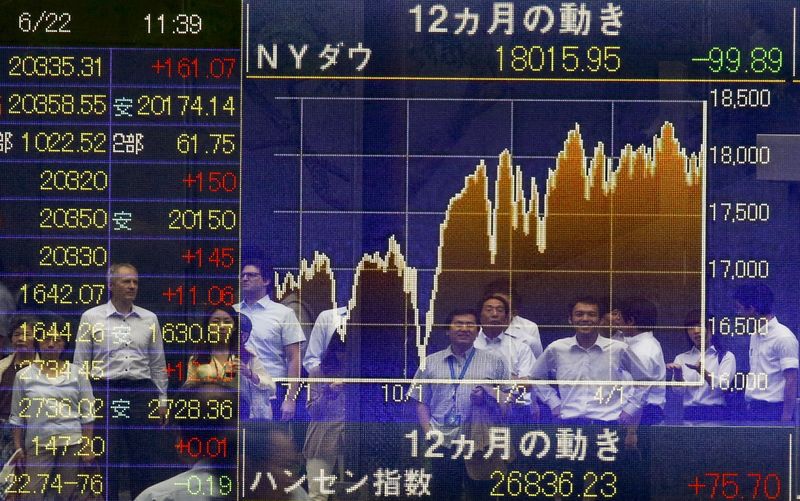By Takaya Yamaguchi and Stanley White
TOKYO (Reuters) - Japan's government said on Monday it would adopt a flexible approach rather than fix a mandatory cap to curb the annual increase in budget spending, as it tries to reduce a mountain of debt.
Releasing a blueprint of its fiscal strategy for the coming years, the government recommended limiting rises in general account spending to 1.6 trillion yen (8.22 billion pounds) for the three years to March 2019, but stopped short of calling for a binding limit.
Prime Minister Shinzo Abe's top economic advisory panel, the Council on Economic and Fiscal Policy, approved the strategy paper on Monday. The content matched a draft obtained and reported by Reuters earlier on Monday.
The absence of a binding cap could raise concern that the government would be tempted to spend more if economic growth falters, and risk increasing a public debt burden that is already more than twice the size of its $5 trillion economy and the largest of any advanced nation.
The strategy paper showed the government has set a goal of keeping GDP growth above 2 percent in real terms and 3 percent in nominal terms.
Policymakers are torn between banking on faster economic growth to increase revenues, as Prime Minister Shinzo Abe hopes, or exercising greater fiscal discipline to cut pressure on debt.
"The government is operating on the assumption that economic growth does well and tax revenue really starts to take off," said Norio Miyagawa, senior economist at Mizuho Securities.
"This is admirable, but when you look at our public finances, you would think a little more effort should be put into cutting spending."
The new guidelines, which will be used to compile next fiscal year's budget, reiterate the government's goal of returning to a primary surplus in fiscal 2020.
The blueprint set an interim target of reducing the primary deficit, which excludes debt servicing and revenue from new debt, to 1 percent of gross domestic product in fiscal 2018.
The plan also calls for limiting increases in welfare and healthcare spending to 1.5 trillion yen over the next three years.
A government official told reporters the government would retain some leeway in determining actual spending increases, and the guidelines set for health and welfare spending or overall spending growth were not firm targets.
"Fiscal policy needs to make allowances for changes in growth and prices," Economics Minister Akira Amari told a briefing.
"If you look at Greece, they have cut pensions and raised taxes. The result was tax revenue fell, which created the need for more spending cuts. We cannot make the same mistake."
Amari's comments came amid rising hopes for Greece to strike a last-minute deal averting bankruptcy and ejection from the euro zone in exchange for concessions lowering some pension payouts and raising taxes.
Some economists, however, argue that Greece's sovereign debt crisis shows Japan should do more to curb welfare spending, rather than slow the annual increase, given its rapid ageing.
The government also released an updated version of its economic growth strategy that focuses on boosting capital expenditure.

Since Abe took office in late 2012 he has vowed to kick-start a listless economy with bold structural reforms, but his first two growth strategy proposals have disappointed markets.